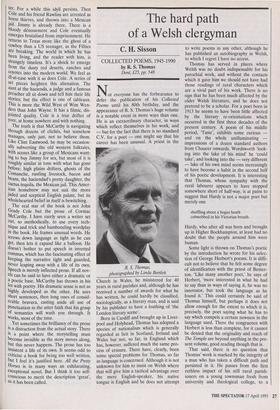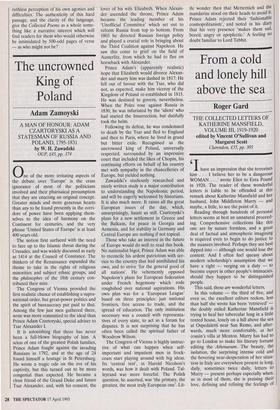The hard path of a Welsh clergyman
C. H. Sisson
COLLEC71ED POEMS, 1945-1990 by R. S. Thomas Dent, f25, pp. 548 Not everyone has the forbearance to defer the publication of his Collected Poems until his 80th birthday, and the appearance of R. S. Thomas's huge volume is a notable event in more ways than one. He is an extraordinary character, in ways which reflect themselves in his work, and — but for the fact that there is no standard C.V. for a poet — one might say that his career has been unusual. A priest in the R. S. Thomas, photographed by Linda Bartlett Church in Wales, he ministered for 40 years in rural parishes and, although he has received a number of awards for what he has written, he could hardly be classified, sociologically, as a literary man, and is said by his publisher to have a loathing of the London literary scene'. Born in Cardiff and brought up in Liver- pool and Holyhead, Thomas has adopted a species of nationalism which is generally regarded as licit in Scotland, Ireland and Wales but not, so far, in England which has, however, suffered much the same pro- cess of erasure. There have, clearly, been some special problems for Thomas, so far as language is concerned. Although it is not unknown for him to insist on Welsh where that will give him a tactical advantage over the mere English-speaker, his native tongue is English and he does not attempt to write poems in any other, although he has published an autobiography in Welsh, to which I regret I have no access.
Thomas has served in places where Welsh was no doubt indispensable for his parochial work, and without the contacts which it gave him we should not have had those readings of rural characters which are a vivid part of his work. There is no sign that he has been much affected by the older Welsh literature, and he does not pretend to be a scholar. For a poet born in 1913 he seems to have been little affected by the literary re-orientations which occurred in the first three decades of the present century. A poem of his middle period, 'Taste', exhibits some curious and on the whole unilluminating impressions of a dozen standard authors from Chaucer onwards. Wordsworth 'look- ing into the lake of his mind' he 'could take', and looking into the — very different — lake of his own mind seems increasingly to have become a habit in the second half of his poetic development. It is interesting that Thomas, whose sympathy with the rural labourer appears to have stopped somewhere short of half-way, is at pains to suggest that Hardy is not a major poet but merely one
shuffling about a bogus heath cobwebbed in his Victorian breath.
Hardy, who after all was born and brought up in Higher Bockhampton, at least had no doubt that the people around him were human.
Some light is thrown on Thomas's poetic by the introduction he wrote for his selec- tion of George Herbert's poems. It is diffi- cult not to believe that he felt some degree of identification with the priest of Bemer- ton. 'Like many another poet,' he says of Herbert, 'more interested in what he had to say than in ways of saying it, he was no innovator, but took the language as he found it.' This could certainly be said of Thomas himself, but perhaps it does not allow enough for the extent to which it is, precisely, the poet saying what he has to say which compels a certain newness in the language used. There the congruence with Herbert is less than complete, for it cannot be denied that the originality and reach of The Temple are beyond anything in the pre- sent volume, good reading though that is.
That said, there is no question that Thomas' work is marked by the integrity of a man who has taken a difficult path and persisted in it. He passes from the first ruthless impact of his still rural parish- ioners on a young townsman fresh from university and theological college, to a ruthless perception of his own agonies and difficulties. The authenticity of this hard passage, and the clarity of the language, give the Collected Poems as a whole some- thing like a narrative interest which will find readers for them who would otherwise be intimidated by 500-odd pages of verse — as who might not be?



















































 Previous page
Previous page